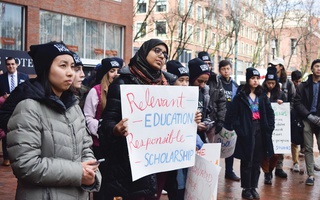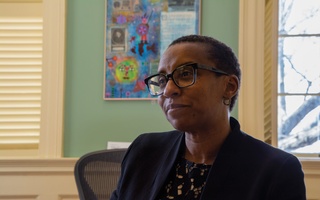{shortcode-05852f9124ac178b59e3d279e740309f3875a1a2}
In the wake of the loss of two tenure-track professors who specialize in Asian-American studies, three student and alumni groups sent letters to University President Lawrence S. Bacow calling for a formalized ethnic studies program.
The groups — the Harvard Ethnic Studies Coalition, the Harvard Asian American Alumni Alliance, and the Coalition For A Diverse Harvard — each sent letters to Bacow last week decrying the impending departures of Associate Professor of Education Natasha K. Warikoo and Assistant Professor of History Genevieve A. Clutario. The University decided in November not to put Warikoo up for tenure, and Clutario recently accepted a position at Wellesley College.
Members of the Harvard Asian American Alumni Alliance Board of Directors wrote in their letter that they were “shocked” and “furious” to learn of the professors’ departures.
“In addition to teaching oversubscribed classes, they stretch themselves as advisors for too many students and as members of multiple committees addressing the need for Asian American Studies and for the greater inclusion of Asian Americans at Harvard,” the board members wrote.
“With Harvard's failure to retain important and beloved faculty in Asian American Studies, we wonder why Harvard's vaunted promise of diversity for the benefit of all students seems to exclude the faculty and academic programs in Ethnic Studies,” they added.
University spokesperson Jonathan L. Swain wrote in an emailed statement that Bacow has received the letters and intends to respond. Swain wrote that the University will not comment on individual tenure cases.
Warikoo confirmed in an email that she was not put for tenure and will be leaving Harvard. Clutario did not respond to a request for comment.
The groups’ recent letters are part of a decades-long effort by activists to push the University to devote more resources to ethnic studies. Since the 1970s, Harvard affiliates have issued 12 formal proposals to administrators, in addition to circulating petitions — including one in 2016 with roughly 1,000 signatories — and directly lobbying administrators. Activists also sent a letter to Bacow in June 2018 urging him to “create a home” for ethnic studies within the Faculty of Arts and Sciences.
Sally Chen ’19, an organizer for the Ethnic Studies Coalition, said she believes Harvard should establish a dedicated program in ethnic studies to prevent the University from continuing to lose professors like Warikoo, who studies racial and ethnic inequality in education, and Clutario, who researches Asian-American history from a transnational perspective.
“These people, without central support, are going to leave,” Chen said. “It’s, in the long term, just a really significant waste of energy and money and resources to not put in the investment to bring people, retain them, and support them.”
“I think we’re tired of seeing band-aid solutions,” she added.
The College established the Ethnicity, Migration, Rights secondary field, then called “Ethnic Studies,” in 2009. In 2017, the Committee on Degrees in History and Literature established a field of specialization in ethnic studies.
FAS Dean Claudine Gay said in an October interview that she planned to recruit faculty who specialize in ethnic studies before making plans for a formalized ethnic studies program. She said she planned to meet with ethnic studies advocates this semester.
Activists are seeking more financial — and structural — backing from the University to create an ethnic studies program.
“We need a robust and interdisciplinary Department of Ethnic Studies that will equip students of all backgrounds with the language and skills needed to grapple with the critical issues of race and ethnicity of our time, including affirmative action,” Ethnic Studies Coalition organizers Juhwan Seo ’17 and Itzel L. Vasquez-Rodriguez ’17 wrote in their letter to Bacow.
Jeannie Park ’83, the president of the Harvard Asian American Alumni Alliance, said Asian-American activists have specifically criticized what they view as an imbalance between Harvard’s stated commitment to diversity — particularly during the ongoing lawsuit alleging the University discriminates against Asian Americans in its admissions process — and Harvard’s perceived lack of support for faculty and courses focused on ethnic studies and Asian-American studies.
”For the students and alumni who testified, putting themselves out there in a very difficult position sometimes, defending race-conscious admissions, talking about the incredible importance of diversity to their educations, it’s dismaying to then feel the rug pulled out from under them in terms of the academic program, which of course is at the heart of what Harvard does,” Park said.
Clarification: Feb. 5, 2019
A previous version of this article stated Warikoo was denied tenure. To clarify, the University chose not to put her up for tenure.
Correction: Feb. 5, 2019
A previous version of this article incorrectly stated Warikoo was not put up for tenure in December. In fact, the University decided not to put her up for tenure in November.
— Staff writer Jonah S. Berger can be reached at jonah.berger@thecrimson.com. Follow him on Twitter @jonahberger98.
—Staff writer Molly C. McCafferty can be reached at molly.mccafferty@thecrimson.com. Follow her on Twitter at @mollmccaff.
Read more in News
UC Votes to Appoint Director of Belonging and InclusionRecommended Articles
-
Ethnic Studies Advocates Call for a Department, Research CenterA group of undergraduates and graduate students are circulating a petition among students, staff, and alumni that calls for the formation of an ethnic studies department and research center.
-
 Student and Alumni Groups Advocate for FAS Dean Who Will Prioritize Ethnic Studies
Student and Alumni Groups Advocate for FAS Dean Who Will Prioritize Ethnic Studies -
 New FAS Dean Gay Recruiting Faculty Who Study Race, Ethnicity
New FAS Dean Gay Recruiting Faculty Who Study Race, Ethnicity -
 Harvard Students Rally for Ethnic Studies Outside Alumni Conference
Harvard Students Rally for Ethnic Studies Outside Alumni Conference -
 Harvard Administrators Respond to Call for Ethnic Studies Program, Recruit Three Professors
Harvard Administrators Respond to Call for Ethnic Studies Program, Recruit Three Professors













